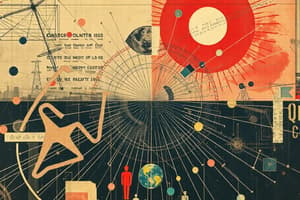Podcast
Questions and Answers
What role does quantum entanglement play in quantum computing?
What role does quantum entanglement play in quantum computing?
Quantum entanglement allows qubits that are entangled to be correlated with each other, enabling a complex interdependent relationship that speeds up computation.
How does quantum supremacy differ from classical computing?
How does quantum supremacy differ from classical computing?
Quantum supremacy refers to a quantum computer's ability to solve problems that are practically unsolvable by classical computers in a reasonable time frame.
In what ways does quantum cryptography enhance security compared to classical cryptography?
In what ways does quantum cryptography enhance security compared to classical cryptography?
Quantum cryptography uses the principles of quantum mechanics, ensuring that any attempt to eavesdrop on communication changes the states of the quantum bits, thus revealing the presence of an intruder.
What is the significance of quantum algorithms in quantum computing?
What is the significance of quantum algorithms in quantum computing?
How does quantum hardware support the functioning of quantum gates?
How does quantum hardware support the functioning of quantum gates?
What defines quantum entanglement in terms of qubits?
What defines quantum entanglement in terms of qubits?
Explain the principle of superposition in quantum mechanics.
Explain the principle of superposition in quantum mechanics.
What is a separable state in quantum systems?
What is a separable state in quantum systems?
Describe Schrödinger's cat paradox.
Describe Schrödinger's cat paradox.
How does quantum entanglement relate to quantum computing?
How does quantum entanglement relate to quantum computing?
What role does quantum cryptography play in secure communications?
What role does quantum cryptography play in secure communications?
What defines a quantum algorithm?
What defines a quantum algorithm?
What makes quantum hardware different from classical hardware?
What makes quantum hardware different from classical hardware?
Can you explain the concept of macroscopic quantum states?
Can you explain the concept of macroscopic quantum states?
What is the significance of entangled states in quantum physics?
What is the significance of entangled states in quantum physics?
What is quantum supremacy and why is it significant in quantum computing?
What is quantum supremacy and why is it significant in quantum computing?
How does quantum cryptography use the principles of quantum mechanics for secure communication?
How does quantum cryptography use the principles of quantum mechanics for secure communication?
What is quantum entanglement and how does it contribute to quantum computing?
What is quantum entanglement and how does it contribute to quantum computing?
What are the key components of quantum hardware that support the functionality of qubits?
What are the key components of quantum hardware that support the functionality of qubits?
Describe the significance of quantum algorithms and provide an example.
Describe the significance of quantum algorithms and provide an example.
What role does the Bloch sphere play in understanding qubits?
What role does the Bloch sphere play in understanding qubits?
Explain the concept of decoherence and its impact on quantum computing.
Explain the concept of decoherence and its impact on quantum computing.
Flashcards
Qubit
Qubit
A quantum mechanical analogue of a classical bit. It's a two-level quantum system that exists in a linear combination of |0⟩ and |1⟩ states, unlike a classical bit which is either 0 or 1.
Quantum Computing
Quantum Computing
Computing based on the laws of quantum mechanics, used to perform calculations at the sub-atomic level.
Superposition
Superposition
The ability of a quantum system to exist in multiple states simultaneously.
Quantum bit (Qubit) states
Quantum bit (Qubit) states
Signup and view all the flashcards
Quantum Mechanical
Quantum Mechanical
Signup and view all the flashcards
Classical Bit
Classical Bit
Signup and view all the flashcards
Classical vs Quantum Computing
Classical vs Quantum Computing
Signup and view all the flashcards
Qubit State
Qubit State
Signup and view all the flashcards
Two-Qubit System
Two-Qubit System
Signup and view all the flashcards
Basis States
Basis States
Signup and view all the flashcards
Tensor Product
Tensor Product
Signup and view all the flashcards
Reversible Logic
Reversible Logic
Signup and view all the flashcards
Quantum Entanglement
Quantum Entanglement
Signup and view all the flashcards
Separable State
Separable State
Signup and view all the flashcards
Entangled State
Entangled State
Signup and view all the flashcards
Quantum Superposition
Quantum Superposition
Signup and view all the flashcards
Schrödinger's Cat Paradox
Schrödinger's Cat Paradox
Signup and view all the flashcards
Energy Eigenstates
Energy Eigenstates
Signup and view all the flashcards
Macroscopic Quantum Superposition
Macroscopic Quantum Superposition
Signup and view all the flashcards
Product state
Product state
Signup and view all the flashcards
Study Notes
Quantum Computing Overview
- Quantum computing uses the laws of quantum mechanics to perform calculations, unlike classical computing which utilizes bits.
- Quantum mechanics deals with particles at the subatomic level.
What is a Quantum Computer?
- A quantum computer is a machine that performs calculations based on the laws of quantum mechanics, studying particles at the subatomic level.
Key Concepts
- Qubit: The fundamental unit of quantum information, analogous to a classical bit. A qubit can exist in both states (0 and 1) simultaneously due to superposition.
- Superposition: A fundamental concept where a qubit exists in multiple states simultaneously. Unlike a classical bit, it can be in a linear combination of |0⟩ and |1⟩, represented as |ψ⟩ = α|0⟩ + β|1⟩, where α and β are complex numbers.
- Entanglement: A phenomenon where two or more qubits become linked in such a way that their fates are intertwined—the measurement of one immediately impacts the state of the others, irrespective of the distance separating them.
Motivation for Quantum Computing
- Two-level atoms can be transformed into qubits for quantum information storage.
- Entangled states enable quantum communication and teleportation. Quantum state engineering allows for control and tunable interactions for enhanced processing, using quantum correlation switches as quantum gates.
Qubit Representation
- A qubit is a two-level quantum system, contrasted to a classical bit which can only be 0 or 1, and can exist in a superposition of states.
- Qubits are represented as |0⟩, |1⟩, or linearly combined states |ψ⟩ = α|0⟩ + β|1⟩.
- Physical implementations can use two energy levels of an atom (excited and ground).
Superposition States
- Superposition states are points on a Bloch sphere.
- Quantum bits (qubits) represent a whole sphere, rather than just the two poles (0 and 1) like classical bits.
- This means quantum bits have much more information encoded in them than classical bits.
- A special, smaller "digital" subset of states on the Bloch sphere can be chosen for computational purposes.
Quantum Gates
- Quantum gates are essential for manipulating qubits, and must be reversible.
- Examples include the Hadamard gate (to create superposition), Controlled-NOT (CN) gate, Controlled Controlled-NOT (CCN) gate, and others.
- The CCN gate is universally recognized as a reversible gate.
- Quantum gates perform similar functions as classical logic gates, but unlike classical logic gates, the quantum gates must be reversible.
Quantum Measurement
- Measurement collapses a qubit into a definite state (0 or 1).
- Measuring a qubit destroys the superposition.
Stern-Gerlach Experiment
- A famous experiment demonstrating the quantum nature of spin.
- Atoms' spin can be measured in different directions, and results in superposition states that depend on the orientation.
Two/Three Qubit Representation
- A two-qubit system combines two individual qubits, leading to a total of four basis states (|00⟩, |01⟩, |10⟩, |11⟩. .
- Similarly, a three-qubit system results in eight basis states. The basis states for n-qubit systems can be described as tensor products of the 1-qubit basis states.
Example Operations
- Reversible logic circuits can be built to calculate multiplication by 2, using specialized quantum gates like controlled NOT gates.
Studying That Suits You
Use AI to generate personalized quizzes and flashcards to suit your learning preferences.




